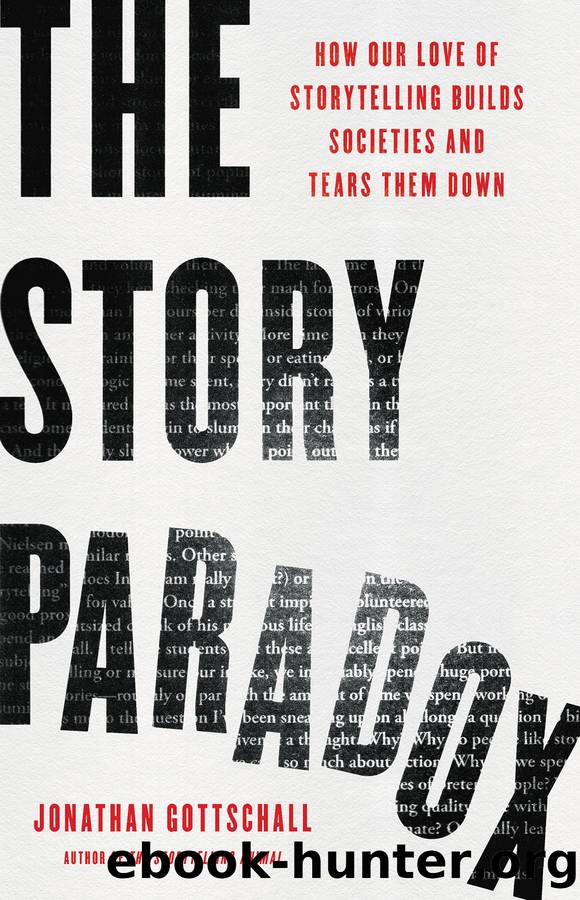The Story Paradox by Jonathan Gottschall

Author:Jonathan Gottschall [Gottschall, Jonathan]
Language: eng
Format: epub
Publisher: Basic Books
Published: 2021-11-23T00:00:00+00:00
Footnote
i Well, usually they do. That stories sometimes get by without villains of any kind is a hopeful point Iâll take up later in the book.
5
THINGS FALL APART
Turning and turning in the widening gyre
The falcon cannot hear the falconer;
Things fall apart; the centre cannot hold
âWilliam Butler Yeats, âThe Second Comingâ
June 1994 was one of the bloodiest months in human history. Rwandan Hutus suddenly rose up and began slaughtering their Tutsi neighbors and coworkers. The shocking ability of the Nazis to murder six million Jews over the course of World War II is usually chalked up to famed German organization, efficiency, and mechanization. But the Hutu massacre of the Tutsis was far more time-efficient despite the medieval nature of most of the weaponryâknives, screwdrivers, some guns, nail-studded bats called masu, and especially machetes.1
This was no pushbutton genocide; it was a genocide by close-range hacking and stabbing. The Nazi machine was as clean and antiseptic as they could make it. In the death camps, Nazis could kill without getting blood on their hands. The Rwandan génocidaires had to bathe in it. You have to really want people dead to kill in this way. Over four months, the Hutu death squads killed 333 Tutsi per hourâthree times the rate of the Nazi death factories. But most of the approximately 800,000 victims died in the month of June.
Ten years later, families and friends across Rwanda huddled around radios listening to a popular soap opera called New Dawn while a team of social scientists studied how it affected them.2 New Dawn was specifically designed to promote healing. It was in most ways an ordinary soap opera, but its creatorsâa Dutch NGO working with local Rwandan talentâwove themes of reconciliation into a Shakespearian plot featuring a young couple who forgo the logic of blood feud and taboos against interethnic marriage in order to forge a life together.
The researchers followed a large and ethnically diverse sample of Rwandans as they listened to the show, got hooked on it, and discussed it avidly in their free time. Listeners also filled out surveys about their social attitudes before hearing the show, and then again at the end of the study.
The show wasnât a panacea. It couldnât bring back dead loved ones or erase bitter memories. But New Dawn performed the empathetic magic of story: it transported listeners not just into a different world but into the skins of âthe other.â The show helped listeners appreciate that people from the rival ethnic group were precisely like them. And at the end of the study listeners were more likely to approve of interethnic marriage, to report higher levels of interethnic trust, and to endorse the necessity of working out differences through conversation not violence.
Stories are empathy machines.3 When they really work, weâre transported into different worlds, into different minds. Stories help us de-otherize one another in the most extreme way imaginableââtheyâ become âus.â At their best, stories show us that our differences are mirages, our prejudices unfounded. To cite just one study, children who read the Harry Potter novels absorb not just J.
Download
This site does not store any files on its server. We only index and link to content provided by other sites. Please contact the content providers to delete copyright contents if any and email us, we'll remove relevant links or contents immediately.
Kathy Andrews Collection by Kathy Andrews(10510)
The remains of the day by Kazuo Ishiguro(7544)
Spare by Prince Harry The Duke of Sussex(4188)
Paper Towns by Green John(4165)
The Body: A Guide for Occupants by Bill Bryson(3791)
Be in a Treehouse by Pete Nelson(3207)
Harry Potter and the Goblet Of Fire by J.K. Rowling(3026)
Goodbye Paradise(2951)
Never by Ken Follett(2873)
Into Thin Air by Jon Krakauer(2695)
The Remains of the Day by Kazuo Ishiguro(2614)
The Genius of Japanese Carpentry by Azby Brown(2602)
The Cellar by Natasha Preston(2592)
Drawing Shortcuts: Developing Quick Drawing Skills Using Today's Technology by Leggitt Jim(2529)
120 Days of Sodom by Marquis de Sade(2428)
Architecture 101 by Nicole Bridge(2348)
The Man Who Died Twice by Richard Osman(2291)
Machine Learning at Scale with H2O by Gregory Keys | David Whiting(2269)
Fairy Tale by Stephen King(2059)
